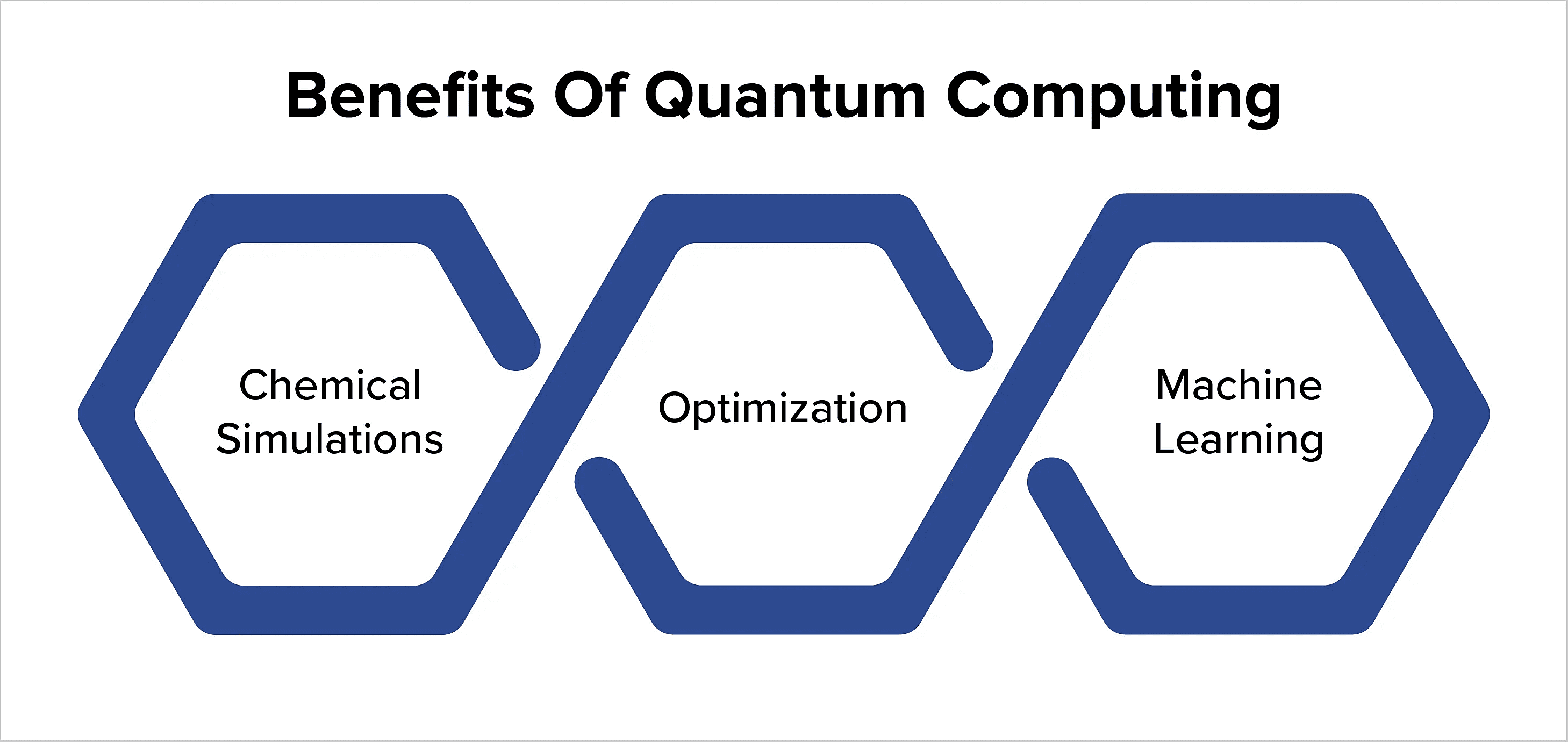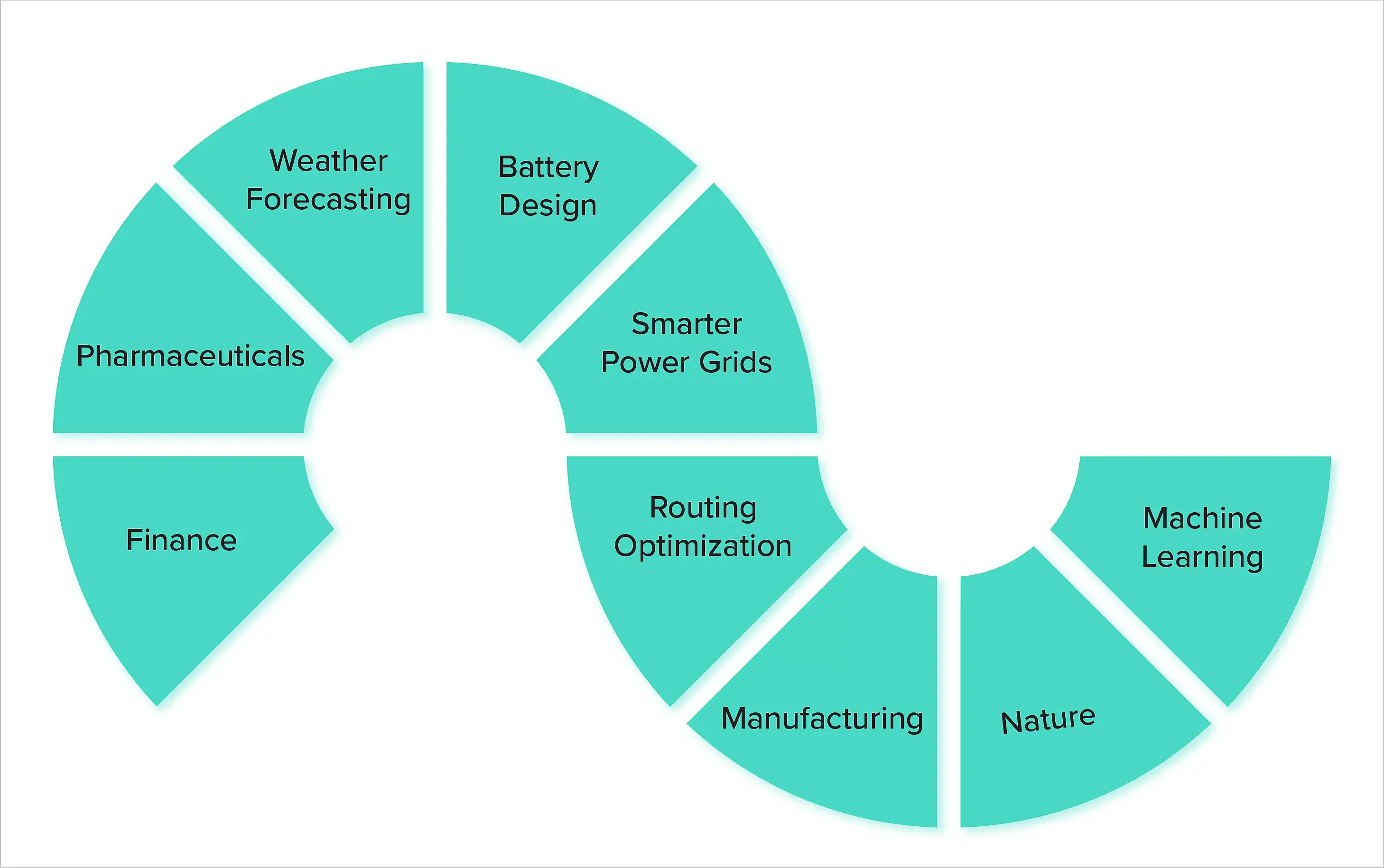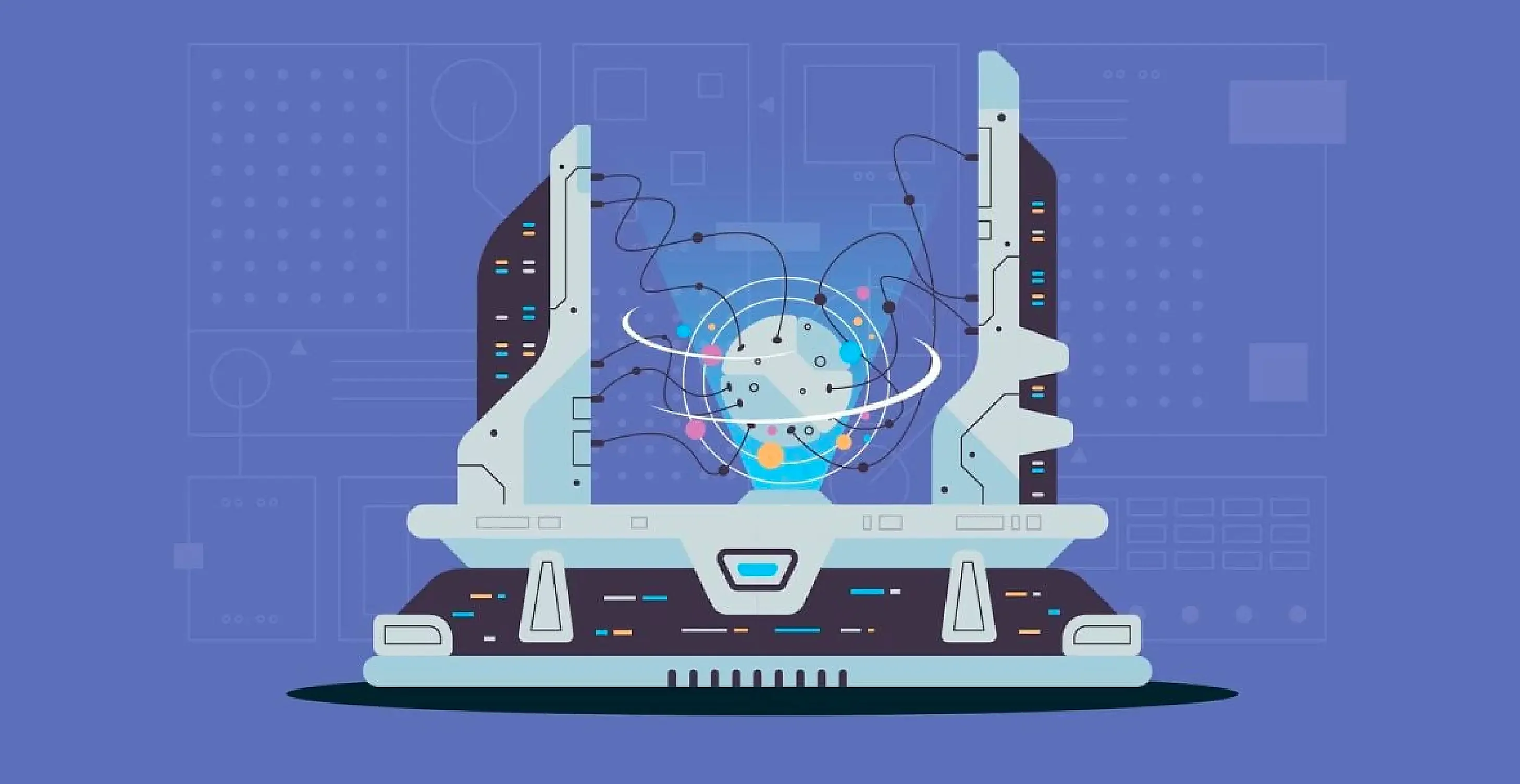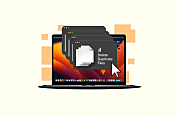
- What Is Quantum Computing?
- The Quantum Computing Market: Key Insights & Stats
- What Are The Benefits Of Quantum Computing?
- The Prominent Use Case Of Quantum Computing
- Some Prominent Examples of Quantum Computing Software
- What Impact Will Quantum Computers Have On The World?
- Summing Up: A Glimpse into Future QC Applications

More swiftly than ever, quantum computing is evolving, which is a powerful reminder that the technology is rapidly moving toward being commercially useful. For instance, a Japanese research institution recently disclosed progress in entangling qubits that could improve quantum error correction and possibly open the door for massively parallel quantum computers.
Quantum computing startups are booming as technology advances and investment surges. Major technological firms are also advancing their quantum capabilities; firms like Alibaba, Amazon, IBM, Google, and Microsoft have already started offering for-profit quantum computing services.
In the current tech world, quantum computing is fit for certain algorithms like optimization, machine learning, and simulation. With the advent of such algorithms in quantum engineering, several use cases can be applied in diverse fields. Starting from finance, fraud detection, healthcare, supply chain management, chemicals, petroleum, and researching new materials are the areas that can have a primary impact.
This article will go into the details of the use cases of quantum computing. But first, let us look at the quantum computing meaning and explore the market overview of quantum computing technology. Let’s start learning!
What Is Quantum Computing?
In the cutting-edge science of quantum computing, data is processed uniquely using concepts from quantum physics. Unlike classical computers, which utilize bits as the basic unit of data (0 or 1), quantum computers use quantum bits, also called qubits. Superposition, a characteristic of qubits that allows them to exist in numerous states concurrently, will enable them to do complex calculations at exponentially quicker rates for specialized jobs.
Innumerable fields, including materials science, artificial intelligence, and encryption, benefit greatly from quantum computing. Researchers and businesses worldwide are attempting to harness its potential and surpass huge technological obstacles, but it is still in its infancy.
One of the latest technology trends that has become widely adopted is quantum computing. A standard processor cannot build effective models to solve complicated issues with regular processing capacity because of the volume of data that businesses collect—for example, finding the greatest prime number to use in encryption.
Let’s move ahead to witness the growing quantum computing market before moving to understand the use cases of quantum computing.
The Quantum Computing Market: Key Insights & Stats
- The Global Quantum Computing Market was estimated to be worth USD 89 million in 2016 and is anticipated to grow at a CAGR of 30% from 2017 to 2025 to reach USD 949 million.
- According to McKinsey, the automobile industry will be one of the key value pools for quantum computing, with a significant influence beginning around 2025. By 2030, they predict that associated technologies will have an economic impact on the automotive sector of $2 to $3 billion.
- By 2030, 2,000–5,000 quantum computers may be operating globally.
- The startups (40%) and the institutions (33%) are the most involved in developing quantum computing.
- From 2 qubits in 1998 to 128 qubits in 2019, quantum computers' qubit counts have rapidly risen.
- The three businesses where quantum computing is most appropriate are finance (28%), global energy and materials (16%), and high-tech.
What Are The Benefits Of Quantum Computing?

Let us explore the transformative benefits and potential uses of quantum computing. Discover the remarkable benefits that quantum engineering offers across diverse fields, from revolutionizing cryptography and accelerating drug discovery to supercharging artificial intelligence and addressing complex optimization problems.
1. Chemical Simulations
Quantum computing can dramatically improve the process and provide numerous benefits in chemical simulation.
Scientists could use this increased computational power to investigate larger and more complex molecular structures, allowing them to achieve more accurate and detailed simulations of chemical systems due to the exponential complexity of the quantum world, which classical computers have difficulty simulating accurately.
A variety of approaches with differing degrees of accuracy and computational expense are used in quantum chemical simulations. Here are three examples:
- The Density Functional Theory (DFT) is a popular method that determines the electronic density rather than the wave function. This technique can handle huge systems and reasonably balance accuracy and computational cost.
- The Hartree-Fock (HF) Theory solves the Schrödinger equation for typical electron behavior and approximations of electron-electron interactions. Despite being beneficial for more complex calculations, it ignores the implications of electron correlation.
- The Post-Hartree-Fock Method is another to be mentioned, which goes beyond the Hartree-Fock approximation to include electron correlation effects properly. Examples include approaches using coupled clusters (CC), coupled configuration interaction (CI), and multi-configuration self-consistent fields (MCSCF).
2. Optimization
Route planning and logistics are also changing due to quantum technology. By providing global routing optimization and regular re-optimizations, the use of quantum computers might drastically lower the cost of freight transportation and increase customer satisfaction.
The Quantum Approximate Optimization Algorithm (QAOA) is one of the most well-known algorithms in quantum optimization. QAOA combines traditional optimization methods with quantum computing to approximate solutions to optimization issues.
Another method that uses quantum fluctuations to locate ideal solutions at low energy levels is known as quantum annealing (QA). Applications of QA that are particularly helpful include the Quadratic Unconstrained Binary Optimization (QUBO) issue and the well-known NP-hard Ising model.
3. Machine Learning
The potential role of quantum computing and AI in developing next-generation artificial intelligence (AI) is also significant. At the same time, it is still debatable whether QML will have any advantages, especially in light of the release of ChatGPT late last year.
For the status quo machine learning (ML) evolving in 2021, which is frequently constrained by a limited scope, an inability to adapt to new scenarios, and a lack of generalization skills, the capacity to handle complexity and keep alternatives open is a clear advantage. Artificial general intelligence (AGI) development may be made possible by a quantum computer, while some consider this the greatest risk.
Now that we have understood the benefits, let’s move to learn the quantum computing use cases.
The Prominent Use Case Of Quantum Computing

While we anticipate quantum advantage to be a reality by 2025, we assist businesses in identifying immediate and longer-term opportunities. Additionally, it goes beyond the uses of quantum computing for business. We also find applications that have significant potential for societal impact.
Several of the more intriguing use cases of quantum computing applications include:
1. Finance
Quantum computers can bring in $2 to $5 billion in operating revenue for financial institutions over the next ten years, coupled with quantum-inspired algorithms running on classical computers. The ability to handle uncertainty in decision-making more effectively is one of the primary benefits of quantum technology for financial actors. Applications include, among others, asset pricing, risk analysis, portfolio optimization, fraud detection, and capital allocation.
The ability of quantum technologies to perform multiple calculations at once makes them particularly well suited to issues that call for simulating situations with various distinct variables or selecting the best course of action from among several possibilities. This applies to a variety of financial sector quantum computing uses.
For instance, Spanish bank BBVA and quantum company Multiverse Computing have teamed up to optimize investment portfolios. The need to account for the effects of numerous external factors on the performance of assets is a well-known issue in finance. The test demonstrated that Multiverse's quantum-inspired computing techniques accelerated the process and could maximize profitability while minimizing risk.
Options pricing is another use in finance. The Swiss startup TerraQuantum is collaborating with the financial services firm Cirdan Capital to price a difficult class of "exotic options" using quantum-inspired algorithms. Typically, this is done using mathematical operations based on market simulations. According to the business, the first data indicate a 75% boost in pricing speed compared to conventional approaches.
Financial organizations are also looking at quantum computing to improve credit risk analysis. French startup PASQAL and Multiverse are working on a quantum approach for French bank Crédit Agricole to anticipate better credit rating downgrades in borrowers. Classical methods already exist for this problem but can't process the particularities of individual situations. The bank expects factorization in quantum computing use cases and algorithms to improve the efficiency of the process.
2. Pharmaceuticals
Pharmaceutical companies can screen bigger and more complicated molecules with quantum computing, map interactions between a medicine and its target more accurately, and accelerate the development process at a lower cost. Better immunizations, treatments, and diagnostics will be available sooner and more effectively.
To create a medicine, one must first choose the appropriate drug target—the protein, DNA, or RNA in the body responsible for a specific disease—and then create the chemical that will safely and efficiently affect that target. Finding the perfect combination is an expensive, time-consuming procedure still largely based on trial and error due to the infinite number of potential targets and compounds.
Qubit Pharmaceuticals, a startup based in Paris, builds digital twins of medicinal compounds using hybrid quantum algorithms. These quantum-based models can simulate how molecules interact with other components and anticipate behavior accurately since they can represent many chemical features. This eliminates the need to synthesize molecules, allowing scientists to create and examine molecules digitally. According to the business, the technique may cut the time needed to screen and choose prospective medication candidates in half and reduce the required investment by 10.
3. Weather Forecasting
Weather forecasts are notoriously inaccurate because they rely on simulations using data from current weather conditions. A model far too vast for a conventional computer would be needed to accurately represent hundreds of parameters and analyze how they interact to predict the weather more precisely.
The capacity of quantum computers to consider a wide range of parameters may change the game. For instance, the German chemical company BASF is implementing PASQAL's technology into its weather-modelling applications to gain a quantum edge over traditional methods.
4. Battery Design
Enhancing battery design entails creating a new generation of more reliable, secure, and affordable gadgets. The main challenge is identifying the precise factors resulting in an improved material, like medication design.
The construction of more effective batteries may be made possible by quantum computers' ability to precisely model chemical processes at the atomic level, according to Finnish quantum firm IQM, which raised €128 million last year for its climate-focused technology. Phasecraft claims that quantum computers could more quickly model battery materials than current technology.
5. Smarter Power Grids
Delivering electricity to the network is a difficult and time-consuming task that involves precise synchronization and coordination of a massive network of sensors, communication infrastructure, data management systems, and control mechanisms. To complete this operation more quickly, quantum computers are a good choice.
Iberdrola, a Spanish utility firm, and Multiverse have teamed up to examine how quantum algorithms might improve the operation of power networks. The project's diverse use cases call for assessing various possible combinations. For instance, the company expects using quantum algorithms to make choosing the best places for batteries within an electrical network easier.
6. Routing Optimization
Numerous variables can affect how long it takes to go from point A to point B. To find the best way, quantum algorithms are being created to calculate how every route and every factor might affect one another.
For instance, the French startup Quandela is collaborating with the global corporation Thales to develop a quantum algorithm that might improve drone traffic. Thales predicts that conventional computers won't be able to consider all the factors that affect trajectory shortly as the number of drones operating in populated areas rises. These range from the technical flight limitations of drones to avoiding drone-drone collisions, taking into account the locations where drones are prohibited, and preserving battery life. Quantum algorithms might model all of these elements to identify the best route for each drone.
7. Manufacturing
Predicting and identifying defective parts in production lines has great economic value for manufacturing. Still, it is difficult due to the massive amount of data that must be accounted for to generate such predictions. Multiverse and Bosch are working together to create digital twins that simulate the industrial line, predict where supply chains may break, and optimize when and where maintenance is required.
Similarly, PASQAL and BMW have collaborated to deploy quantum algorithms that can replicate the production of metallic pieces to detect faults and ensure that parts meet standards.
8. Nature
Molecular modeling enables breakthroughs such as more efficient lithium batteries. Quantum computing will allow us to model atomic interactions at much finer and greater scales. New materials can be employed in several quantum applications, including consumer goods, automobiles, and batteries. Without approximations, quantum computing will enable molecular orbit calculations.
A greater knowledge of the interactions between atoms and molecules will allow for the development of novel medications. Detailed DNA sequence analysis will aid in detecting cancer at an early stage by establishing models that will determine how diseases evolve.
Quantum technology will have the benefit of allowing for a scale-dependent, in-depth analysis of molecular behavior. Chemical simulations will enable the development of novel drugs or improve protein structure predictions, scenario simulations can improve the ability to predict the likelihood that a disease will spread or its risks, the solution of optimization problems will improve drug distribution chains, and finally, the application of AI will hasten diagnosis and provide more accurate genetic data analysis.
New methods for combating climate change can be made possible by quantum computing. Modeling molecular interactions involving 50 to 150 atoms, which classical computers cannot handle, is one of the early uses. Better and more effective chemical catalysts may be created, leading to lower emissions and more effective carbon capture and storage techniques. In the future, quantum technology might aid in creating stronger and lighter building materials for automobiles and aircraft.
9. Machine Learning
The field of artificial intelligence (AI), which fundamentally alters how businesses run, presents both fresh chances for advancement and difficulties. According to the artificial intelligence guide, the power of AI to interpret and analyze data has significantly improved. Due to the complexity of workflows and the increasing amount of data that needs to be processed, AI is also computationally demanding.
We may be able to solve complicated issues that were previously intractable thanks to machine learning and quantum computing, which can also speed up processes like model training and pattern recognition. The three types of computing that will predominate in the future are classical, biologically inspired, and quantum.
The development of quantum machine learning algorithms like the Quantum-enhanced Support Vector Machine (QSVM), QSVM multiclass classification, variational quantum classifier, or qGANs has received a lot of attention in recent years because of the intersection of quantum computing and machine learning.
Some Prominent Examples of Quantum Computing Software
Let us dive into the example of a use case in quantum computing.
- Qiskit: An open-source framework for developing quantum algorithms and programs. It is created and maintained by IBM and can be used on various hardware systems.
- ProjectQ: An open-source quantum computing software framework that enables the rapid construction of quantum algorithms using high-level programming languages.
- PyQuil: Rigetti Computing created a Python library for quantum programming. It enables quantum programs to be executed on various quantum computing hardware platforms.
- Microsoft Quantum Development Kit: A package of tools and libraries for quantum development on the .NET framework that runs on Windows, Linux, and macOS.
- Google Cirq: An open-source platform for designing and manipulating quantum circuits. It works with the Google platform and can be accessed on several hardware platforms.
These are some of the most popular software platforms, but many more software platforms and libraries are being developed and utilized in quantum computing.
What Impact Will Quantum Computers Have On The World?

Quantum computers, in some ways, are transforming the world right now. First, engineering breakthroughs are announced regularly. ColdQuanta, for example, uses lasers to ultracool atoms to nanoKelvins or degrees above absolute zero to use as qubits. And that's just one illustration of how the quantum computing industry's engineering discoveries will help the planet.
Second, quantum physics is moving from theory to experiment. Using ColdQuanta as an example, physicists worldwide can create and experiment with Bose-Einstein Condensates (BEC), often known as "quantum matter," through their cloud-accessible Albert system. While Albert is not a quantum computer, its younger relative Hilbert will also use ultracold atom technologies.
Furthermore, computer science is progressing rapidly. Since Ewin Tang set the bar with recommendation systems, scientists have been motivated to speed up conventional algorithms using quantum algorithms. This quantum-inspired technique provides immediate benefits because classical algorithms can be implemented today. As it was following Ewin Tang's breakthrough, the challenge now is to create even more powerful quantum algorithms.
Finally, quantum computers are significantly less harmful to the environment than supercomputers. That estimate, by the way, includes the adoption of extreme refrigeration and all of the associated power consumption. However, certain qubit technologies work at ambient temperature and can eliminate the need for a dilution chiller, lowering energy use even more.
Quantum computers will not replace personal computers. Since it is more efficient, numerous programs will continue functioning on current devices. However, quantum computing applications go far beyond number factoring and unstructured search. In reality, the future of quantum computing appears to be good for almost everyone.
Summing Up: A Glimpse into Future QC Applications
Despite recent significant advancements in the development of quantum computing hardware and algorithms, the technology still has few practical applications. Nevertheless, the use cases presented are sufficient evidence of the potential that quantum computing (or quantum mechanics) can offer us.
But as quantum computing technologies develop, more real-world applications will probably follow. But for now, we can only monitor the market and wait for well-researched use cases from some of the world's top businesses, research organizations, and people. Only then will we witness how quantum computing applications may improve our lives.
Frequently Asked Questions
-
How Does Quantum Computing Address Currently Unsolvable Problems?
-
What Are Some Key Use Cases for Quantum Computing?
-
What is the connection between quantum computing and AI?
-
What's a Real-World Use Case in Quantum Computing?

Sr. Content Strategist
Meet Manish Chandra Srivastava, the Strategic Content Architect & Marketing Guru who turns brands into legends. Armed with a Masters in Mass Communication (2015-17), Manish has dazzled giants like Collegedunia, Embibe, and Archies. His work is spotlighted on Hackernoon, Gamasutra, and Elearning Industry.
Beyond the writer’s block, Manish is often found distracted by movies, video games, AI, and other such nerdy stuff. But the point remains, If you need your brand to shine, Manish is who you need.













